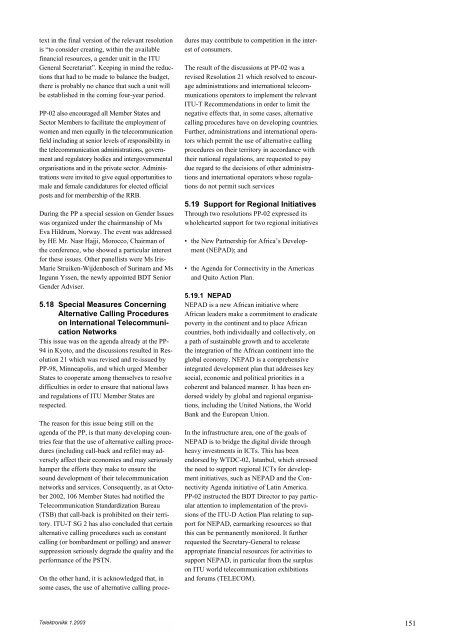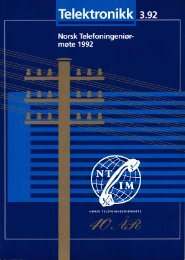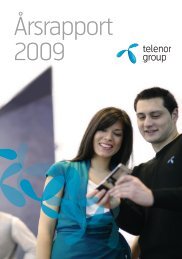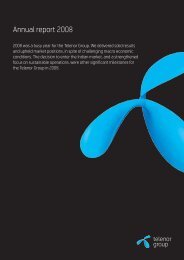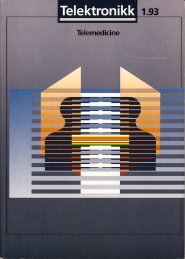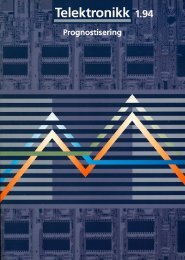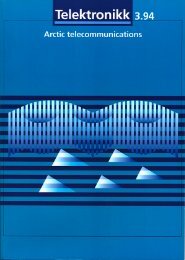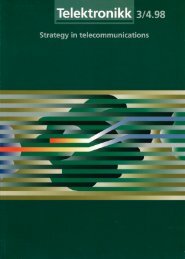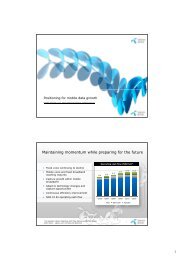Intelligent Transport Systems - Telenor
Intelligent Transport Systems - Telenor
Intelligent Transport Systems - Telenor
You also want an ePaper? Increase the reach of your titles
YUMPU automatically turns print PDFs into web optimized ePapers that Google loves.
text in the final version of the relevant resolution<br />
is “to consider creating, within the available<br />
financial resources, a gender unit in the ITU<br />
General Secretariat”. Keeping in mind the reductions<br />
that had to be made to balance the budget,<br />
there is probably no chance that such a unit will<br />
be established in the coming four-year period.<br />
PP-02 also encouraged all Member States and<br />
Sector Members to facilitate the employment of<br />
women and men equally in the telecommunication<br />
field including at senior levels of responsibility in<br />
the telecommunication administrations, government<br />
and regulatory bodies and intergovernmental<br />
organisations and in the private sector. Administrations<br />
were invited to give equal opportunities to<br />
male and female candidatures for elected official<br />
posts and for membership of the RRB.<br />
During the PP a special session on Gender Issues<br />
was organized under the chairmanship of Ms<br />
Eva Hildrum, Norway. The event was addressed<br />
by HE Mr. Nasr Hajji, Morocco, Chairman of<br />
the conference, who showed a particular interest<br />
for these issues. Other panellists were Ms Iris-<br />
Marie Struiken-Wijdenbosch of Surinam and Ms<br />
Ingunn Yssen, the newly appointed BDT Senior<br />
Gender Adviser.<br />
5.18 Special Measures Concerning<br />
Alternative Calling Procedures<br />
on International Telecommunication<br />
Networks<br />
This issue was on the agenda already at the PP-<br />
94 in Kyoto, and the discussions resulted in Resolution<br />
21 which was revised and re-issued by<br />
PP-98, Minneapolis, and which urged Member<br />
States to cooperate among themselves to resolve<br />
difficulties in order to ensure that national laws<br />
and regulations of ITU Member States are<br />
respected.<br />
The reason for this issue being still on the<br />
agenda of the PP, is that many developing countries<br />
fear that the use of alternative calling procedures<br />
(including call-back and refile) may adversely<br />
affect their economies and may seriously<br />
hamper the efforts they make to ensure the<br />
sound development of their telecommunication<br />
networks and services. Consequently, as at October<br />
2002, 106 Member States had notified the<br />
Telecommunication Standardization Bureau<br />
(TSB) that call-back is prohibited on their territory.<br />
ITU-T SG 2 has also concluded that certain<br />
alternative calling procedures such as constant<br />
calling (or bombardment or polling) and answer<br />
suppression seriously degrade the quality and the<br />
performance of the PSTN.<br />
On the other hand, it is acknowledged that, in<br />
some cases, the use of alternative calling proce-<br />
Telektronikk 1.2003<br />
dures may contribute to competition in the interest<br />
of consumers.<br />
The result of the discussions at PP-02 was a<br />
revised Resolution 21 which resolved to encourage<br />
administrations and international telecommunications<br />
operators to implement the relevant<br />
ITU-T Recommendations in order to limit the<br />
negative effects that, in some cases, alternative<br />
calling procedures have on developing countries.<br />
Further, administrations and international operators<br />
which permit the use of alternative calling<br />
procedures on their territory in accordance with<br />
their national regulations, are requested to pay<br />
due regard to the decisions of other administrations<br />
and international operators whose regulations<br />
do not permit such services<br />
5.19 Support for Regional Initiatives<br />
Through two resolutions PP-02 expressed its<br />
wholehearted support for two regional initiatives<br />
• the New Partnership for Africa’s Development<br />
(NEPAD); and<br />
• the Agenda for Connectivity in the Americas<br />
and Quito Action Plan.<br />
5.19.1 NEPAD<br />
NEPAD is a new African initiative where<br />
African leaders make a commitment to eradicate<br />
poverty in the continent and to place African<br />
countries, both individually and collectively, on<br />
a path of sustainable growth and to accelerate<br />
the integration of the African continent into the<br />
global economy. NEPAD is a comprehensive<br />
integrated development plan that addresses key<br />
social, economic and political priorities in a<br />
coherent and balanced manner. It has been endorsed<br />
widely by global and regional organisations,<br />
including the United Nations, the World<br />
Bank and the European Union.<br />
In the infrastructure area, one of the goals of<br />
NEPAD is to bridge the digital divide through<br />
heavy investments in ICTs. This has been<br />
endorsed by WTDC-02, Istanbul, which stressed<br />
the need to support regional ICTs for development<br />
initiatives, such as NEPAD and the Connectivity<br />
Agenda initiative of Latin America.<br />
PP-02 instructed the BDT Director to pay particular<br />
attention to implementation of the provisions<br />
of the ITU-D Action Plan relating to support<br />
for NEPAD, earmarking resources so that<br />
this can be permanently monitored. It further<br />
requested the Secretary-General to release<br />
appropriate financial resources for activities to<br />
support NEPAD, in particular from the surplus<br />
on ITU world telecommunication exhibitions<br />
and forums (TELECOM).<br />
151


